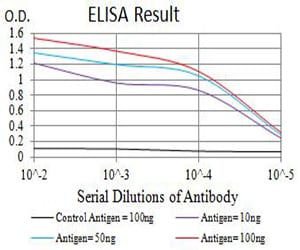
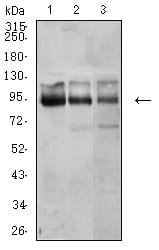
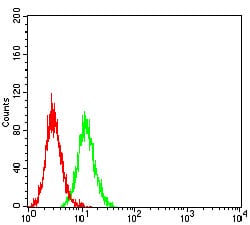
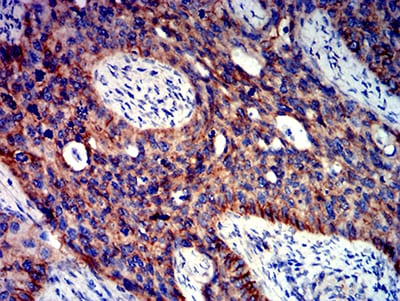
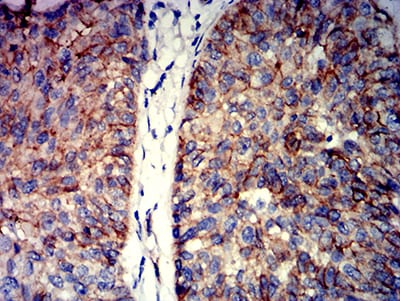
| WB | 1/500 - 1/2000 | Human,Mouse,Rat |
| IF | 咨询技术 | Human,Mouse,Rat |
| IHC | 1/200 - 1/1000 | Human,Mouse,Rat |
| ICC | 技术咨询 | Human,Mouse,Rat |
| FCM | 1/200 - 1/400 | Human,Mouse,Rat |
| Elisa | 1/10000 | Human,Mouse,Rat |
| Aliases | CTNNB; MRD19; armadillo;Beta-catenin |
| Entrez GeneID | 1499 |
| clone | 7C5D2 |
| WB Predicted band size | 85.5kDa |
| Host/Isotype | Mouse IgG2b |
| Antibody Type | Primary antibody |
| Storage | Store at 4°C short term. Aliquot and store at -20°C long term. Avoid freeze/thaw cycles. |
| Species Reactivity | Human |
| Immunogen | Purified recombinant fragment of human CTNNB1 (AA: 1-100) expressed in E. Coli. |
| Formulation | Purified antibody in PBS with 0.05% sodium azide |
+ +
1. **"Nuclear β-catenin accumulation in colorectal cancer: a comparison of antibody performance in immunohistochemistry"**
- Author: van der Wetering et al.
- 摘要:该研究比较了多种CTNNB1(β-catenin)抗体在结直肠癌组织中的免疫组化染色效果,发现不同抗体对核定位β-catenin的检测敏感性存在显著差异,强调了抗体选择对研究结果的影响。
2. **"Constitutive transcriptional activation by a β-catenin-Tcf complex in APC-/- colon carcinoma"**
- Author: Morin et al.
- 摘要:通过使用CTNNB1抗体进行免疫沉淀和Western blot,揭示了APC基因缺失导致β-catenin异常积累并激活Wnt信号通路,驱动结直肠癌发生的分子机制。
3. **"CTNNB1 mutations and β-catenin expression in hepatocellular carcinomas"**
- Author: Satoh et al.
- 摘要:研究利用CTNNB1特异性抗体分析肝细胞癌中β-catenin的突变与蛋白表达模式,发现突变导致β-catenin核转位增加,并与患者预后不良相关。
4. **"Antibody validation for Western blot: Importance of genetic knockout controls"**
- Author: Niehrs & Boutros
- 摘要:文章讨论了抗体验证的重要性,并以CTNNB1抗体为例,通过CRISPR敲除细胞系证明部分商业抗体存在非特异性结合问题,呼吁标准化抗体质量控制流程。
CTNNB1 encodes β-catenin, a multifunctional protein central to cell-cell adhesion and Wnt signaling. As a key component of the cadherin complex, it binds E-cadherin at the plasma membrane to maintain epithelial tissue architecture. Simultaneously, it acts as a transcriptional co-activator in the canonical Wnt pathway, regulating genes involved in cell proliferation, differentiation, and embryonic development. Dysregulation of CTNNB1. particularly through mutations or abnormal nuclear accumulation, is strongly associated with cancers (e.g., colorectal carcinoma, hepatocellular carcinoma) and developmental disorders.
CTNNB1 antibodies are essential tools for detecting β-catenin expression, localization, and activation status in research and diagnostics. They enable visualization of β-catenin's dual roles: membranous localization indicates normal cell adhesion function, while nuclear/cytoplasmic accumulation reflects Wnt pathway activation. Specific antibodies can distinguish between phosphorylated (degradation-targeted) and non-phosphorylated (transcriptionally active) forms, providing insights into pathway activity. These antibodies are widely used in techniques like Western blotting, immunohistochemistry, and immunofluorescence. In clinical contexts, CTNNB1 immunostaining aids in diagnosing desmoid tumors and subtypes of medulloblastoma with Wnt pathway activation. Research applications include studying epithelial-mesenchymal transition, cancer metastasis, and therapeutic targeting of Wnt/β-catenin signaling. Commercial CTNNB1 antibodies vary in clonal specificity, with some preferentially recognizing wild-type versus mutated β-catenin forms.
×